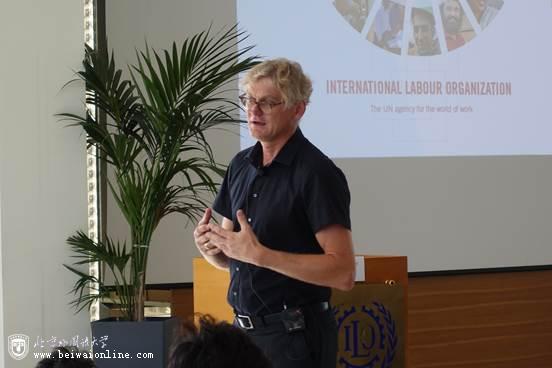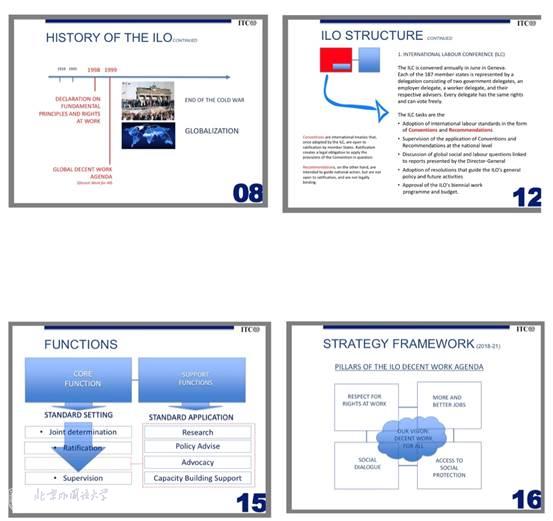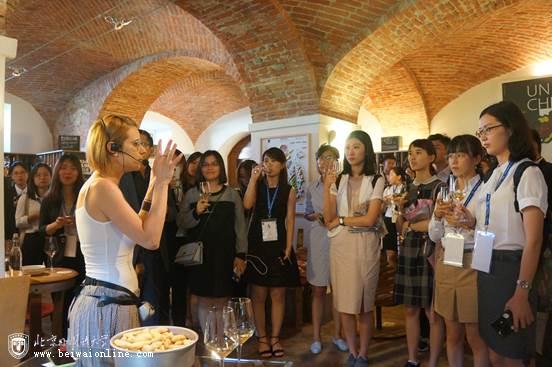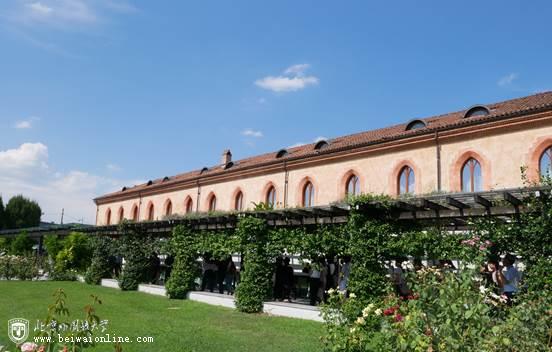8月8日,国际劳工组织国际培训中心培训部主任Andreas Klemmer受邀给150余位师生就联合国劳工组织(简称ILO)的相关内容进行了介绍。
On August 8, Andreas Klemmer, Director of the Training Department of the International Training Center of the International Labor Organization, was invited to introduce the relevant content of the United Nations Labor Organization (ILO) to more than 150 teachers and students.

国际劳工组织国际培训中心培训部主任Andreas Klemmer
Director of Training of the International Training Centre of the ILO
整个讲座包括ILO发展历史,内部结构、具体职责和战略框架等,同学们对相关话题表现出巨大的热情。Andreas Klemmer详尽介绍了自1919年来,从雏形到逐步规整的国际劳工组织的发展历程。也将其内部运转方式,中心职责等一一向同学们阐述。
The students showed great enthusiasm for today’s lecture, which included the related topics like the history of ILO development, internal structure, specific responsibilities and strategic framework.
Andreas Klemmer gave a detailed account of the development of the ILO since its inception in 1919. Besides, he explained the internal operation mode, the central responsibility and other important knowledge to the students.

在之后的Q&A环节中,魏晓然同学对ILO制定各种计划时面临的国家权力和公正问题提出了自己的疑惑,Andreas Klemmer也给予了耐心的解释和回答。
In the subsequent Q&A session, Wei Xiaoran raised her doubts about the state power and justice issues faced by the ILO in formulating various plans, and Andreas Klemmer also gave patient explanations and answers.

魏晓然
根据日程安排,一行人下午乘车前往位于皮埃蒙特西北部的美食科学大学进行slow food和wine的相关考察和品鉴。并且分配有专业人员对不同种类的葡萄酒的储藏、生产等进行了专业的解释。同学们在品尝不同风味酒的同时,更了解到很多平常不能接触到的葡萄酒知识,为未来进入工作社交环境打下基础。
According to the schedule, a group of people took a bus to the University of Gastronomic Sciences (UNISG) in the northwest of Piedmont for a study and tasting of slow food and wine. Professionals are also assigned to explain the storage and production of different types of wine. While tasting different flavors of wine, the students learned more about the wines that they would not normally be able to access, laying the foundation for a future social environment.


行程满满,感触多多。但愿都灵此行我们都能收获良多。
The full agenda made us feel significantly. I hope that we can all harvest a lot in Turin.
Appendix:
Andreas Klemmer is an expert in training programme management. He graduated in 1994 from the University of Heidelberg with a Magister in Political Science. He also holds a postgraduate degree in International Development Studies from the German Development Institute obtained in 1996, and a diploma in Hispano-American studies from the University of Madrid awarded in 1990.
Mr Klemmer joined the ILO in 1996 as Junior Professional Expert in the ILO-facilitated Start and Improve Your Business programme for Southern and Eastern Africa, based in Zimbabwe. He then managed ILO-facilitated enterprise development projects in Sri Lanka (2000-2004) and China (2004-2006), before being appointed senior enterprise development specialist based in the ILO Decent Work Support Team for Eastern and Southern Africa in South Africa.
In November 2013, Mr Klemmer was appointed Director of Training of the International Training Centre of the ILO, and tasked with the management of the global portfolio of training and learning activities at the Centre. In January 2015, he also assumed the position of Assistant Director of the Turin School of Development, to synchronize the training and learning activities of the Centre with its masters’ programmes, and to support the Director of the School in facilitating the annual programme schedule.
介绍摘自ITCILO官网 https://www.itcilo.org/en
University of Gastronomic Sciences (UNISG)
Founded by the Slow Food movement and located in the heart of the food and wine region of Piedmont, Italy, is a ministerially recognized, private non-profit institution. The University supports a unique educational design, that is based on cross-disciplinary learning, practical experience and study trip around the world. Its goal is to create the professional gastronome figure who is skilled in the production, distribution, promotion, and communication of high-quality foods. Gastronomes are the next generation of educators and innovators, editors and multimedia broadcasters, marketers of fine products, and managers of food and wine companies. UNISG students, hailing from around the world, gain dynamic experiences in artisanal and industrial food production, thanks to complementary education in both sciences and humanities, sensory training, and hands-on learning during study trips across five continents. To date, more than 2,000 students have studied or are studying at UNISG.
何海玉